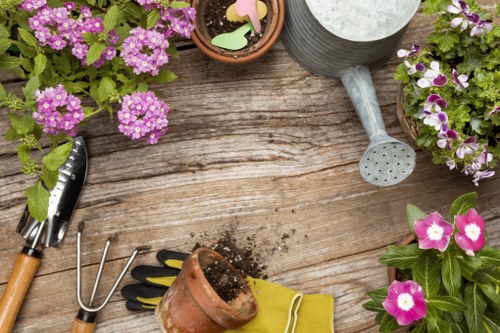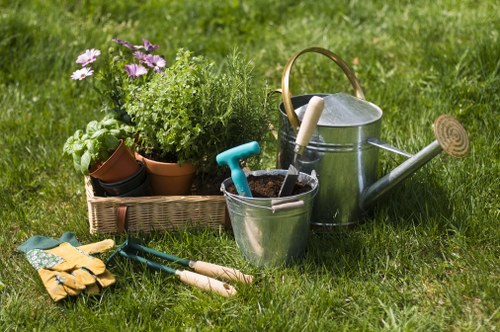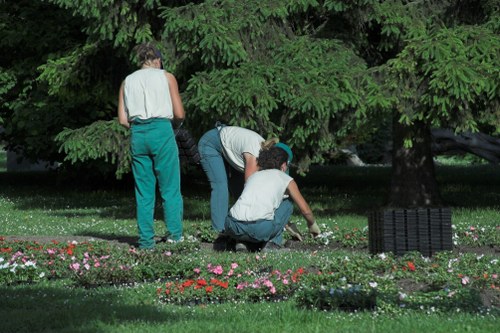Comprehensive Guide to Garden Maintenance in Gunnersbury

Garden maintenance is essential for ensuring that your outdoor space remains beautiful, healthy, and functional throughout the year. In Gunnersbury, a vibrant area known for its lush greenery and community spirit, maintaining a garden can enhance both your property’s aesthetic and its value.
Whether you are a seasoned gardener or a novice, understanding the specific needs of your garden in Gunnersbury is crucial. The local climate, soil conditions, and plant varieties all play a significant role in determining the best maintenance practices.
In this article, we will explore various aspects of garden maintenance tailored specifically for the Gunnersbury area. From seasonal tasks to selecting the right plants, we aim to provide a comprehensive overview to help you achieve a thriving garden.

Understanding Gunnersbury's Climate and Soil
The climate in Gunnersbury is characterized by mild winters and warm summers, with adequate rainfall throughout the year. This temperate climate is conducive to a wide variety of plants, but it also requires specific maintenance strategies to cope with seasonal changes.
Soil type is another critical factor. Gunnersbury's soil tends to be loamy, offering a good balance of sand, silt, and clay. However, it's essential to test your soil's pH and nutrient levels to ensure it meets the needs of your chosen plants.
Regular soil testing and amendments can help maintain optimal soil health. Adding organic matter, such as compost, can improve soil structure, enhance fertility, and promote beneficial microbial activity.
Seasonal Considerations
Each season brings its own set of challenges and opportunities for garden maintenance. Understanding these can help you plan effectively and ensure your garden remains robust year-round.
Spring: This is a time for planting new growth, pruning overgrown shrubs, and preparing flower beds.
Summer: Focus on watering, weeding, and protecting plants from pests and excessive heat.
Tips for Each Season
- Spring: Apply a balanced fertilizer, mulch to retain moisture, and start planting perennials.
- Summer: Implement a regular watering schedule, prune dead branches, and monitor for pests.
- Autumn: Clean up fallen leaves, plant bulbs for next spring, and prepare plants for winter.
- Winter: Protect sensitive plants with covers, prune dormant trees, and plan next year's garden layout.

Choosing the Right Plants for Gunnersbury Gardens
Selecting plants that thrive in Gunnersbury's climate and soil conditions is fundamental to successful garden maintenance. Opt for native species or those well-suited to the local environment to reduce maintenance efforts and promote sustainability.
Consider factors such as sunlight exposure, water requirements, and growth habits when choosing plants. Grouping plants with similar needs together can simplify care routines and enhance the overall health of your garden.
Popular Plant Varieties
Some popular plant choices for Gunnersbury gardens include:
- Roses: Known for their beauty and fragrance, roses require regular pruning and feeding.
- Lavender: A hardy plant that thrives in full sun and well-drained soil, perfect for borders and pathways.
- Hostas: Ideal for shaded areas, offering lush foliage and low maintenance needs.
- Hydrangeas: Provide stunning blooms and adapt well to various soil types with proper care.
Companion Planting
Implementing companion planting techniques can improve plant health and reduce pest problems. For example, planting marigolds alongside vegetables can deter harmful insects, while basil can enhance the growth of tomatoes.

Essential Garden Maintenance Tasks
Regular maintenance tasks are vital for keeping your garden in top condition. Establishing a routine helps prevent issues before they escalate and ensures your garden remains attractive and healthy.
Key maintenance activities include:
Pruning and Trimming
Pruning promotes healthy growth by removing dead or diseased branches and shaping plants for better airflow and light penetration. It's essential to use the right tools and techniques to avoid damaging your plants.
Weeding
Weeds compete with your plants for nutrients, water, and light. Regular weeding helps maintain plant health and reduces the risk of pests and diseases.
Watering
Proper watering is crucial, especially during dry spells. Install a drip irrigation system to provide consistent moisture directly to the plant roots, minimizing water waste and reducing the risk of fungal diseases.
- Water early in the morning to reduce evaporation.
- Use mulch to retain soil moisture and regulate temperature.
- Monitor soil moisture levels to prevent over or under-watering.

Dealing with Pests and Diseases
Protecting your garden from pests and diseases is a critical aspect of maintenance. Implementing preventive measures and early interventions can save your plants from significant damage.
Integrated Pest Management (IPM) is an effective strategy that combines biological, cultural, and chemical practices to manage pest populations sustainably.
Common Pests in Gunnersbury
Some common garden pests include aphids, slugs, snails, and caterpillars. Identifying the type of pest early allows for targeted control measures.
Organic Solutions
Opt for organic pest control methods to protect beneficial insects and maintain garden biodiversity. Examples include:
- Introducing natural predators like ladybugs to control aphids.
- Using neem oil or insecticidal soaps for broader pest issues.
- Setting up beer traps for slugs and snails.
Disease Prevention
To prevent plant diseases, ensure proper spacing for airflow, avoid overhead watering, and remove any infected plant material promptly. Regular monitoring and maintaining plant health are key to minimizing disease outbreaks.
Fungicide Use
If necessary, apply fungicides according to the manufacturer's instructions. Always choose eco-friendly options to minimize environmental impact.

Mulching and Soil Health
Mulching is a fundamental garden maintenance practice that offers numerous benefits, including moisture retention, temperature regulation, and weed suppression.
Choose the right type of mulch based on your garden's needs. Organic mulches, such as bark, straw, or compost, enrich the soil as they decompose, while inorganic mulches like gravel or plastic can provide longer-lasting coverage with less maintenance.
Benefits of Mulching
- Moisture Conservation: Mulch helps retain soil moisture, reducing the need for frequent watering.
- Temperature Regulation: It insulates the soil, keeping roots cool in summer and warm in winter.
- Weed Control: A thick layer of mulch inhibits weed growth by blocking sunlight.
- Soil Improvement: Organic mulches break down over time, adding nutrients to the soil.
Application Tips
To apply mulch effectively:
- Clear the area of weeds and debris.
- Spread a 2-3 inch layer of mulch around your plants, keeping it away from stems and trunks to prevent rot.
- Replenish mulch as needed, especially after heavy rains or as organic material decomposes.
Choosing the Right Mulch
Selecting the appropriate mulch depends on your garden's specific needs. For flower beds, organic mulches like shredded leaves or compost work well, while pathways may benefit from gravel or stone mulches for durability and ease of maintenance.

Irrigation Systems for Efficient Watering
Efficient watering is a cornerstone of effective garden maintenance. In Gunnersbury, where water conservation is increasingly important, investing in a reliable irrigation system can save time and resources.
There are various types of irrigation systems to consider, each with its own advantages. Drip irrigation, for example, delivers water directly to the plant roots, minimizing evaporation and runoff.
Types of Irrigation Systems
- Drip Irrigation: Ideal for vegetable gardens and flower beds, providing precise watering and reducing water waste.
- Sprinkler Systems: Suitable for lawns and larger areas, though they can be less water-efficient compared to drip systems.
- Soaker Hoses: Simplified alternatives to drip systems, allowing water to seep slowly into the soil.
- Automated Timers: Enhance any irrigation system by scheduling watering times, ensuring consistency and efficiency.
Benefits of Automated Irrigation
Automated irrigation systems offer several benefits:
- Consistent watering schedules reduce plant stress.
- Remote control features allow easy adjustments based on weather conditions.
- Water savings through targeted and efficient delivery.
- Time savings by automating routine watering tasks.
Installation and Maintenance
Proper installation is crucial for system efficiency. Consider consulting a professional to design and install your irrigation setup. Regular maintenance, such as checking for leaks and adjusting nozzles, ensures optimal performance.

Seasonal Planting and Garden Design
Strategic planting and thoughtful garden design contribute significantly to the long-term success of your garden. By planning for different seasons, you ensure continuous blooms and year-round interest.
Incorporating a variety of plant types, including annuals, perennials, shrubs, and trees, adds depth and resilience to your garden. Additionally, integrating hardscape elements like paths, benches, and water features can enhance functionality and aesthetic appeal.
Planning for Year-Round Interest
- Spring: Plant early bloomers like tulips and daffodils.
- Summer: Focus on vibrant flowers such as petunias and marigolds.
- Autumn: Incorporate plants with colorful foliage like maples and asters.
- Winter: Use evergreens and ornamental grasses to maintain structure.
Design Principles
Adhering to basic design principles can elevate your garden's appearance:
- Balance: Distribute plant sizes and colors evenly across the space.
- Contrast: Combine different textures and colors for visual interest.
- Scale: Ensure plant sizes are proportionate to the garden space.
- Focal Points: Create areas of interest with features like a flowering tree or a decorative sculpture.
Sustainable Gardening Practices
Implementing sustainable practices not only benefits the environment but also enhances garden health. Techniques such as rainwater harvesting, composting, and using native plants reduce your garden's ecological footprint and foster a thriving ecosystem.

Tools and Equipment for Effective Garden Maintenance
Having the right tools and equipment is essential for efficient garden maintenance. Investing in quality tools can make tasks easier and more enjoyable, while also ensuring the health of your plants.
Basic garden tools every gardener in Gunnersbury should have include:
- Pruning Shears: For precise cutting of branches and stems.
- Garden Fork: Useful for turning soil and aerating beds.
- Hose and Sprinkler: For effective watering of plants.
- Gloves: Protect your hands from thorns, dirt, and pests.
- Wheelbarrow: Facilitates the transport of materials like soil, compost, and plants.
Advanced Equipment
For larger gardens or more intensive maintenance, consider investing in advanced equipment such as:
- Lawn Mower: Essential for maintaining a neat and healthy lawn.
- String Trimmer: Perfect for edging and cutting grass in hard-to-reach areas.
- Leaf Blower: Efficiently clears leaves and debris from garden beds and paths.
- Power Pruners: Ideal for handling thicker branches with ease.
Maintenance of Tools
Proper maintenance of your garden tools extends their lifespan and ensures they perform effectively:
- Clean tools after each use to prevent rust and buildup.
- Sharpen blades regularly for clean cuts.
- Store tools in a dry, sheltered place to protect them from the elements.
- Oil moving parts to maintain functionality and prevent wear.
Safety Considerations
Always prioritize safety when using garden tools and equipment. Wear appropriate protective gear, follow manufacturer instructions, and be mindful of your surroundings to prevent accidents and injuries.

Professional Garden Maintenance Services in Gunnersbury
While many garden maintenance tasks can be handled by homeowners, enlisting the help of professional services can ensure optimal results, especially for larger or more complex gardens.
Professional gardeners bring expertise in plant selection, soil management, and maintenance techniques, tailored to the specific conditions of Gunnersbury gardens.
Benefits of Hiring Professionals
- Expert Knowledge: Professionals understand the local climate, soil conditions, and plant varieties, allowing for informed decisions.
- Time Savings: Outsourcing maintenance frees up your time to enjoy your garden rather than work on it.
- Quality Results: Experienced gardeners ensure that maintenance tasks are performed correctly and efficiently.
- Comprehensive Services: Many professionals offer a range of services, from regular maintenance to complete garden redesigns.
Choosing the Right Service
When selecting a garden maintenance service in Gunnersbury, consider factors such as:
- Experience: Look for companies with a proven track record in garden maintenance.
- Services Offered: Ensure they provide the specific services you need.
- Customer Reviews: Check testimonials and reviews to gauge customer satisfaction.
- Pricing: Compare quotes to find a service that fits your budget without compromising quality.
Custom Maintenance Plans
Many professional services offer customized maintenance plans tailored to your garden's unique needs. These plans can include regular visits, seasonal tasks, and specialized treatments to keep your garden in peak condition.
Contacting Professionals
Ready to elevate your garden maintenance? Contact us today to discuss your garden’s needs and schedule a consultation.

DIY Garden Maintenance Tips
For those who prefer a hands-on approach, DIY garden maintenance can be both rewarding and cost-effective. Implementing the right strategies can help you maintain a thriving garden with minimal effort.
Here are some practical tips to keep your garden in excellent shape:
Regular Inspection
Frequent checks allow you to identify and address issues early. Look for signs of pests, diseases, or nutrient deficiencies and take corrective action promptly.
Proper Tool Use
Using the right tools for each task ensures efficiency and prevents damage to plants. Invest in quality tools and learn how to use them correctly.
Sustainable Practices
Adopt environmentally friendly practices such as composting kitchen scraps, using natural fertilizers, and conserving water to create a sustainable garden ecosystem.
- Start a compost bin to recycle organic waste.
- Use rain barrels to collect and reuse rainwater.
- Choose eco-friendly pest control methods to protect beneficial insects.
Learning and Growing
Continuously educate yourself about gardening techniques and trends. Attend local workshops, join gardening clubs, and read reputable sources to expand your knowledge and improve your garden maintenance skills.
Resource Management
Efficiently manage your garden resources by planning ahead and organizing your tasks. Create a maintenance schedule, track your garden’s progress, and adjust your strategies as needed to ensure ongoing success.

Landscape Lighting and Garden Aesthetics
Enhancing your garden with landscape lighting and thoughtful aesthetic choices can transform it into a stunning outdoor sanctuary. Proper lighting not only highlights key features but also extends the usability of your garden into the evening hours.
When planning garden aesthetics, consider elements such as color schemes, plant arrangements, and decorative features to create a harmonious and inviting space.
Types of Landscape Lighting
- Path Lights: Illuminate walkways and paths, ensuring safety and guiding visitors through the garden.
- Spotlights: Highlight specific features like trees, sculptures, or water features.
- String Lights: Add a warm and festive ambiance to outdoor seating areas and patios.
- Underplant Lighting: Create dramatic effects by lighting up ground cover and low-lying plants.
Choosing the Right Fixtures
Select lighting fixtures that complement your garden’s style and provide the necessary illumination. Energy-efficient LED lights are a popular choice due to their longevity and low power consumption.
Installation Tips
Proper installation ensures the effectiveness and safety of your lighting setup:
- Plan your lighting layout to cover all areas of interest without over-lighting.
- Use waterproof and weather-resistant fixtures for durability.
- Consider professional installation for complex lighting designs.
- Implement timers or smart controls to manage lighting schedules efficiently.
Enhancing Garden Aesthetics
Beyond lighting, other aesthetic enhancements can elevate your garden's appeal:
- Garden Art: Incorporate sculptures, statues, or decorative fountains to add personality.
- Plant Variety: Use a mix of textures, colors, and heights to create visual interest.
- Seating Areas: Designate comfortable spaces for relaxation and socializing.
- Water Features: Add ponds, waterfalls, or birdbaths to attract wildlife and create a soothing atmosphere.
Maintaining Aesthetic Elements
Regular maintenance of decorative elements ensures they remain attractive and functional. Clean and repair fixtures as needed, prune plants to maintain their shape, and refresh garden art to keep your garden looking its best.

Eco-Friendly Garden Maintenance Practices
Adopting eco-friendly practices in your garden maintenance not only benefits the environment but also promotes a healthier and more resilient garden.
Here are some sustainable strategies to consider:
Composting
Composting organic waste transforms kitchen scraps and garden trimmings into valuable soil amendments. This reduces landfill waste and enriches your soil with essential nutrients.
Rainwater Harvesting
Collecting rainwater helps conserve water resources and provides your plants with natural, chemical-free moisture. Install rain barrels or cisterns to capture and store runoff from your roof.
Organic Gardening
Use organic fertilizers and pest control methods to maintain soil health and protect beneficial insects. Avoid synthetic chemicals that can harm the ecosystem and contaminate water sources.
- Natural Fertilizers: Utilize compost, manure, or fish emulsion to nourish your plants.
- Biological Pest Control: Introduce predatory insects or use beneficial nematodes to manage pest populations.
- Crop Rotation: Change plant locations each season to prevent soil depletion and reduce pest buildup.
Solar-Powered Features
Incorporate solar-powered lights or water features to reduce energy consumption and lower your garden's carbon footprint.
Habitat Creation
Create habitats for local wildlife by planting native species, providing water sources, and installing birdhouses or bat boxes. A biodiverse garden supports a balanced ecosystem and enhances the natural beauty of your space.

Budget-Friendly Garden Maintenance Tips
Maintaining a beautiful garden doesn't have to be expensive. With some creativity and resourcefulness, you can keep your garden thriving while staying within your budget.
Here are some cost-effective maintenance strategies:
DIY Projects
Engage in do-it-yourself projects to save money and add a personal touch to your garden:
- Build Raised Beds: Use reclaimed wood or inexpensive materials to create raised garden beds.
- Create Compost Bins: Construct your own compost bins using pallets or wire mesh.
- Make Mulch: Shred branches and leaves to use as mulch around your plants.
Reuse and Recycle
Repurpose household items and materials for garden use:
- Use old containers as plant pots or planters.
- Repurpose broken tools into garden art or functional items.
- Recycle rainwater instead of using tap water for irrigation.
Cost-Effective Plant Care
Implementing simple plant care techniques can reduce costs and enhance plant health:
- Mulch: As mentioned earlier, mulching conserves moisture and reduces the need for frequent watering.
- Pruning: Regular pruning promotes healthy growth and reduces the likelihood of disease.
- Seed Saving: Collect and save seeds from your favorite plants for future planting seasons.
- Natural Fertilizers: Use kitchen scraps and compost to fertilize your plants naturally.
Local Resources
Take advantage of local resources and community initiatives:
- Participate in community seed swaps to acquire new plant varieties.
- Attend free gardening workshops or seminars offered by local nurseries or community centers.
- Borrow tools from neighbors or community tool libraries to reduce expenses.
Long-Term Savings
Investing in durable tools and high-quality plants can lead to long-term savings by reducing the need for frequent replacements and minimizing maintenance efforts.

Conclusion: Achieving a Beautiful Garden in Gunnersbury
Effective garden maintenance in Gunnersbury involves understanding the local climate, selecting appropriate plants, and implementing sustainable practices. Whether you choose to maintain your garden yourself or hire professionals, the key is consistency and attention to detail.
By following the tips and strategies outlined in this guide, you can create and maintain a garden that not only enhances your property's beauty but also provides a serene and enjoyable outdoor space for you and your community.
Ready to transform your garden? Book your service now and take the first step towards a thriving and picturesque garden in Gunnersbury.